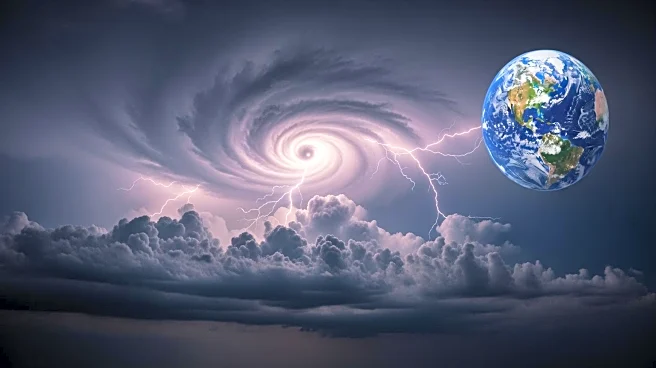What's Happening?
The United Nations weather agency has reported a significant increase in carbon dioxide levels in the atmosphere, marking the highest annual rise on record. According to the World Meteorological Organization (WMO), CO2 growth rates have tripled since
the 1960s, reaching levels not seen for over 800,000 years. This surge is attributed to emissions from burning coal, oil, and gas, as well as increased wildfires. The report highlights a concerning trend where natural systems, such as forests and oceans, are losing their ability to absorb these emissions, exacerbating the climate crisis. The WMO warns that this 'turbo-charging' of the climate is leading to more extreme weather events globally.
Why It's Important?
The record increase in CO2 levels has significant implications for global climate policy and environmental stability. As natural carbon sinks like the Amazon rainforest show signs of failing, the ability to mitigate climate change through natural processes is diminishing. This development underscores the urgency for policymakers to implement more aggressive measures to reduce emissions. The continued rise in greenhouse gases threatens to derail efforts to limit global temperature increases, as outlined in the Paris Agreement. The situation poses a risk to economic security and community well-being, highlighting the need for coordinated international action to address the climate crisis.
What's Next?
The WMO's findings are likely to influence discussions at the upcoming U.N. climate conference, where global leaders will be urged to strengthen their commitments to reducing emissions. The report calls for immediate action from governments to curb the use of fossil fuels and invest in sustainable energy solutions. As the world grapples with the consequences of climate change, there is a growing need for innovative approaches to enhance the capacity of natural systems to absorb CO2. The data may prompt countries to reassess their climate strategies and increase their efforts to meet the targets set by international agreements.
Beyond the Headlines
The report raises ethical and environmental concerns about the long-term viability of current industrial practices. The potential failure of natural carbon sinks could lead to irreversible damage to ecosystems, affecting biodiversity and human livelihoods. This scenario emphasizes the importance of integrating environmental considerations into economic planning and development. The findings also highlight the interconnectedness of global systems, where actions in one region can have far-reaching impacts on the climate and environment worldwide.
















